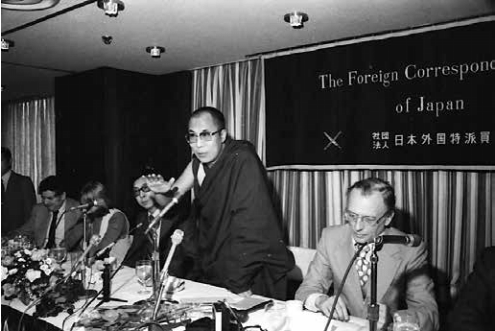Issue:
From now until our 70th anniversary in November 2015, we will turn these pages over to the history of the Club, both of the many esteemed and important guests who faced us – and the world – from the FCCJ dais and of the many Members who have made the Club such a fascinating place to be.
READY TO RETURN

Drawing the second largest audience in the Club’s administrative year of 1980-81, the Dalai Lama assured members on Nov. 12, 1980, that he eventually expected to return to Tibet “. . . when the people there were happy and content.” Only Prime Minister Zenko Suzuki had attracted a larger attendance some two months earlier. That’s Jack Russell (NBC News), President of the FCCJ, in the foreground. Ed Reingold (Time), who succeeded Jack as president, is visible to the far left.
BORN LHAMO THONDUP ON July 6, 1935, he became Tibet’s spiritual and political leader as the Dalai Lama in 1950 at age 15, but invasion by the People’s Republic of China (PRC) cut his rule short later in the same year. He and thousands of his followers established a separate government in Dharamsala in northern India in 1959 after a failed uprising by the Tibetan people. Later efforts to make Tibet a self-governing democratic “sanctuary,” with the PRC responsible for foreign policy and defense, were unsuccessful.
Unable to achieve rapprochement with the PRC, the Dalai Lama continued to dedicate his life to peace and reconciliation, traveling the world to meet world leaders and to conduct lectures, conferences, and workshops. He was awarded the Nobel Peace Prize in 1989 for supporting nonviolence and global environmental protection. Health concerns led to his semi-retirement in 2008 and in 2011 he gave up his position as Tibet’s political leader.
One description that sums up the Dalai Lama nicely was found in this bio (www.biography.com/people/ dalai-lama-9264833) and reads…
Dalai Lamas are believed to be the reincarnation of Avalokitesvara, an important Buddhist deity and the personification of compassion. Dalai Lamas are also enlightened beings who have postponed their own afterlife and chosen to take rebirth to benefit humanity. “Dalai” means “ocean” in Mongolian (the name “Gyatso” comes from the Tibetan word for ocean). “Lama” is the equivalent of the Sanskrit word “guru,” or spiritual teacher. Put together, the title of Dalai Lama is literally “Ocean Teacher,” meaning a “teacher spiritually as deep as the ocean.”

